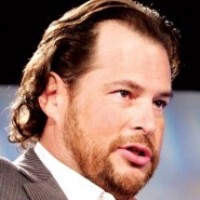

There are 815,358 residents of San Francisco County, according to the 2010 US census. Only one of them was asked to host the president of the United States when he visited the Bay Area on April 20: Marc Benioff.
That was the day President Obama held a well-chronicled town hall-type Q&A session with Mark Zuckerberg and an international audience at Facebook’s Palo Alto headquarters. Afterwards, Mr. Obama helicoptered to Marc and Lynne Benioff’s Pacific Heights residence for a $35,800-per-plate fund-raising dinner event.
It was certainly a magical evening. “Stevie Wonder wrote an amazing new song called ‘10 Billion Hearts Beating as One,'” Benioff told eWEEK.
Wonder is a superstar of the music world; Obama in the political world. And Benioff, founder and CEO of Salesforce.com and offshoots such as Force.com and Chatter.com, has been a legitimate superstar of the business and IT worlds ever since he foresaw what we now know as the “cloud” more than a decade ago.
In fact, Rob Enderle, principal analyst and president of the Enderle Group in San Jose, California, credits Benioff and Salesforce.com for pretty much defining cloud computing as we know it today.
“Salesforce.com was really the first big wake-up call on cloud computing, coming before we really understood what it meant,” Enderle told eWEEK. “They were the test case that showcased the massive advantages of going in this direction, and, for the most part, the cloud computing industry owes much of its success — particularly in the applications space — to them.”
Since Benioff, a fourth-generation San Franciscan, founded Salesforce.com in March 1999 in a rented Telegraph Hill apartment, the company has grown to become an $18 billion (£11bn) conglomerate with 90,000 customers. Its headquarters is at One Market Street, an old-school but classy-looking building in one of the most prestigious locations in San Francisco.
The CEO’s mission hasn’t wavered in the dozen years Salesforce.com has been supplying online sales and management tools to corporations, small and midsize businesses, and single-owner proprietorships: to help companies do their business more effectively — and to do it without selling on-premises IT hardware and software.
“The world is changing rapidly,” Benioff said, “and we’re moving into this mobile, social world that’s [running] on next-generation open platforms. That’s very exciting. All of our customers are rethinking their applications: to run their company, to work with their customers, to collaborate, to share information.
“A lot of these customers are still on old platforms, like Lotus Notes or Microsoft SharePoint, and they want to evolve. You see this huge surge in new technology, like BlackBerrys, iPads. … I see our customers deploying thousands of iPads, and we just bought 2,000 iPads for our own reps.”
Continued on page 2
NHS software services provider Advanced Computer Software Group fined £3m over ransomware breach that compromised…
China's BYD beats out Tesla in worldwide revenues with $107bn in sales for 2024, as…
Ubisoft and Tencent to create new joint-venture developing some of company's highest-profile games, including Assassin's…
American space agency prepares for testing of Boeing's Starliner, to ensure it has two space…
As UK and Europe develop closer military ties, European Commission says it will invest €1.3…
Zuckerberg seeks to revive Facebook's original spirit, as Meta launches Facebook Friends tab, so users…